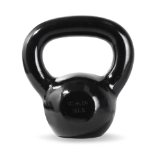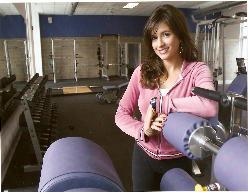 You either love them or you hate them.
You either love them or you hate them.
When you are in love with kettlebells, like I am, you enjoy the multi-muscle group movements. Kettlebell workouts are fluid, like a dance, putting together a chain of movements that leave your heart pounding and sweat pouring. Yes, there’s some sneaky cardio component to a kettlebell workout. A great blend of aerobic and anaerobic conditioning.
If you hate kettlebells it’s because kettlebell exercises keep you honest with proper exercise execution. Form is imperative to moves like the kettlebell swing or the kettlebell snatch. Do it incorrectly and you’ll be either sore or have bruised wrists the next day. But this is no reason to shy away from the kettlebell. You have way too much to gain from this odd looking piece of exercise equipment.

You will get a mega -caloric burn. The American council on Exercise states that the average kettlebell workout burns 20 calories per minute. That’s 1200 calories in just one hour. Kettlebell workouts utilize many muscle groups to give you an efficient, total body conditioning workout.
If you’re looking for a toned back side get a kettlebell. The classic kettlebell swing works all the posterior muscles like your glutes, hamstrings, and lower back. But only if you use correct form. Otherwise you'll find yourself with nagging back pain, instead of a better butt.
Kettlebell exercises are functional movements that will allow you to play hard without getting injured. If you are an athlete, a nature enthusiast, or just want to keep up with the kids then you need to give kettlebells a try. During a workout, the exercises will target movements that will make getting up and down off the floor easier, as well as bending over to pick something up.
If you are interested in doing kettlebell workouts
start with a coach or take class. You can’t fake form with kettlebell exercises or you could end up hurt. I’m not trying to scare anyone away because good form is easy to learn. Your body will memorize the correct movement pattern and you’ll be on your way to a successful kettlebell workout.